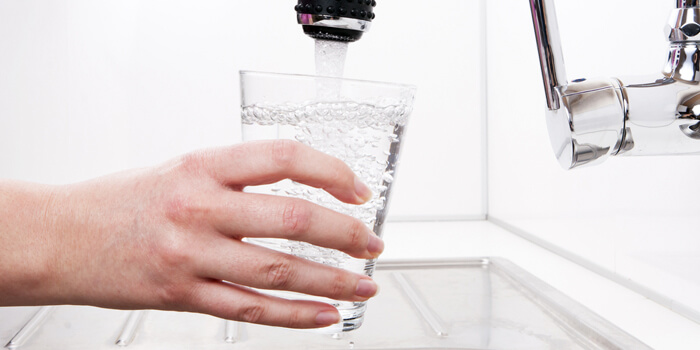Myth number 1. You need to drink at least 2 liters of water every day.
This postulate of a healthy lifestyle was promulgated in 1945 for the first time. Then Nutrition Board of the US advised to drink 8 glasses of water a day in order to stay in shape and keep your body clean and tidy. Since then, many diets include a similar recommendation, and people are of the opinion that a large amount of fluid helps to lose weight.

Actually. By itself, the water will not do you any harm, but everything can be harmful in large quantities. Try to estimate how much fluid you consume in a day. Even if you exclude all other drinks, you still eat vegetables and fruits, that provide your body with fluid. If you go too far, it can cause a condition called hyponatremia, or, more simply, the lack of salt in the body. This will increase the risk of cardiovascular and other serious diseases, said Dr. Rachel Vriman, at the Center for Child Health Research at Indiana University.
Myth number 2. Our hair turns gray from stress
It is believed that stress can cause everything – from acne to cancer. Many people say that it is also the reason of the hair loss. But what do the scientists think?
Actually. Stress has a negative impact on our body. The more a person is nervous, the faster it grows old, said Dr. Nancy Sniderman, because stress increases the amount of free radicals in the body. And they, in turn, can cause the appearance of wrinkles and hair loss. However, there is no scientific evidence that stress causes graying. The time of appearance of gray hair is determined by our genes.
Myth number 3. Reading in dimly lit room can cause problems with vision
Do you remember that rules from your childhood? Brush your teeth in the morning, wash your hands before you eat, sit up straight and do not read under the covers. And now the half of the population of our planet is sure that this rule is inviolable.
Actually. When you read in low light, your eyes have to strain seriously. But the headache and possibly wrinkles around your eyes are the only consequences that you can face. In addition, the eyes may be ill for a while. You will feel itching and dryness, but it will pass fairly quickly. No long-term effect of reading in low light does not exist, says Sniderman.
Myth number 4. Coffee is bad
Disputes between coffee and tea lovers come from ancient times, and probably they will not end for a very long time. Let us give only the medical facts.
Actually. We return to the question about the sense of measures. Of course, if you do not move away from the coffee machine night after night, in the evening you will be a real bundle of nerves, ready to explode at any moment. This is the effect of stress on the body. But if you observe moderation, coffee can even be useful.
First, coffee, as well as green tea, contains antioxidants (of course, when it is made of natural product). Coffee reduces your risk of diabetes of the second type, says nutritionist Stacy Beeson. Coffee can reduce the risk of diabetes by 30%. Other similar surveys show that coffee reduces the possibility of bowel cancer, liver cirrhosis, Parkinson’s disease, and cholelithiasis.
Another plus is that coffee stimulates brain activity and does not increase the chance of undermining the cardiovascular system.
The norm for the average person – not more than 3 cups a day (at the rate of 100 ml per cup), says Beeson. If that amount brings you insomnia and high blood pressure, trim it twice or go to the substitutes. During pregnancy or lack of calcium in the body it is better to consult a doctor before drinking coffee.
Myth number 5. You shouldn’t eat if your temperature is high
This myth came to us from the ancient times. People didn’t know how to treat a cold. Another reason for this belief – is that digestion slightly raises the body temperature.
Actually. Generally, chill and fever are caused by different viruses. These viruses can live in our organism for 7-10 days. The period of life of the virus doesn’t depend on the way you eat, says Vriman. Doctors have no scientific evidence that diet during illness somehow affects the body’s resistance. You need fluids to prevent dehydration. Additionally, moisture will reduce the amount of mucus.
Myth number 6. Fresh food is better than frozen

Since scientists found out such wonderful thing as antioxidants, nutritionists pray for fresh products. “Freezing kills the nutrients” – this phrase is repeated by physicians like a mantra. The same applies to any method of cooking, associated with heat treatment.
Actually. Frozen fruits and vegetables can be as good as fresh, if they are collected and frozen at the peak of maturity. A cold treatment and hermetic packaging retain much more vitamins than remains in the “fresh” products that are kept in the supermarket refrigerator.
Myth number 7. The consumption of eggs can increase cholesterol
The logic is simple: eggs contain a lot of cholesterol. So the level of harmful substances in the blood rises.
Actually. Recent studies in this area have shown that cholesterol levels affect only certain types of dietary fat. The eggs contain protein, vitamins A and D. They are inexpensive, available and easy to prepare. So one egg per day will be a very useful component in your diet, says Beeson.
Myth number 8. You can become ill if it is cold outside
Do you remember this phrase from your childhood? But does it really work?
Actually. Lowering of the ambient temperature does not affect the state of immunity. Unless, of course, we are not talking about extreme degrees of frostbite when it is not necessary to worry about the cold already. And we have a cold, as mentioned above, due to the virus. Cold-related diseases are not connected with the temperature. During winter days we spend hours indoors, we travel by the subway, we sit in a cafe instead of walking on the street. And this is the most fertile ground for the spread of the infection.



